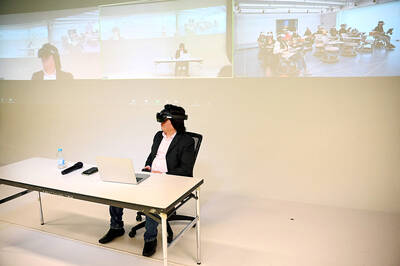Maldivian President Mohamed Muizzu wants Indian military personnel stationed in his archipelago nation withdrawn by March 15, an official at his office said on Sunday.
Presidential aide Abdulla Nazim Ibrahim told reporters that Muizzu proposed the removal at a meeting with officials from the Indian embassy in the Maldives and other visiting Indian officials.
The move comes a day after Muizzu returned from China, where he made comments critical of India.

Photo: AFP
Muizzu said his nation’s small size is not a license for anyone to bully the Maldives. His comments were an apparent response to social media calls in India to boycott tourism to the Maldvies after three Maldivian deputy ministers made derogatory posts on social media against Indian Prime Minister Narendra Modi.
The dispute began last week when Modi posted photographs on social media of himself strolling on the beach and snorkeling in Lakshadweep, an Indian archipelago that his government believes has untapped potential for tourism.
Some in the Maldives saw it as an attempt to lure tourists away from its sandy white beaches and luxury island resorts.
Muizzu suspended the deputy ministers, saying their comments did not reflect government policy, but on his return from China announced plans to free the Maldives of its dependence on India and find alternate places for Maldivians to obtain education and health services, and import staples and medicines.
Maldivians go to hospitals in India and Sri Lanka under a government-sponsored free health program and many of the nation’s staple foods are imported from India.
Muizzu said Maldivians would now be able to also go to hospitals in Thailand and the United Arab Emirates, and staples would be imported from Turkey. He also said medicines would be imported directly from manufacturers in Europe and the US.
India sent the highest number of tourists to the Maldives last year with a share of 11 percent, but Muizzu said that China used to send the most before the COVID-19 pandemic and steps would be taken to double the number visiting.
India and China are competing for influence in the Maldives, which is located strategically along a key shipping route between the east and the west.
At least 75 Indian military personnel are stationed in the Maldives and Muizzu, who is considered pro-China, campaigned on a promise of removing them in the buildup to a presidential election in November last year. His party had waged an “India Out” campaign for months.
Muizzu had accused his election rival and predecessor of compromising national sovereignty by allowing India to station military personnel in the Maldives.

DISPUTED WATERS: The Philippines accused China of building an artificial island on Sabina Shoal, while Beijing said Manila was trying to mislead the global community The Philippine Coast Guard (PCG) is committed to sustaining a presence in a disputed area of the South China Sea to ensure Beijing does not carry out reclamation activities at Sabina Shoal (Xianbin Reef), its spokesperson said yesterday. The PCG on Saturday said it had deployed a ship to Sabina Shoal, where it accused China of building an artificial island, amid an escalating maritime row, adding two other vessels were in rotational deployment in the area. Since the ship’s deployment in the middle of last month, the PCG said it had discovered piles of dead and crushed coral that had been dumped

Experts have long warned about the threat posed by artificial intelligence (AI) going rogue, but a new research paper suggests it is already happening. AI systems, designed to be honest, have developed a troubling skill for deception, from tricking human players in online games of world conquest to hiring humans to solve “prove-you’re-not-a-robot” tests, a team of researchers said in the journal Patterns on Friday. While such examples might appear trivial, the underlying issues they expose could soon carry serious real-world consequences, said first author Peter Park, a postdoctoral fellow at the Massachusetts Institute of Technology specializing in AI existential safety. “These

The most powerful solar storm in more than two decades struck Earth on Friday, triggering spectacular celestial light shows from Tasmania to the UK — and threatening possible disruptions to satellites and power grids as it persists into the weekend. The first of several coronal mass ejections (CMEs) — expulsions of plasma and magnetic fields from the sun — came just after 4pm GMT, according to the US National Oceanic and Atmospheric Administration’s Space Weather Prediction Center. It was later upgraded to an “extreme” geomagnetic storm — the first since the “Halloween Storms” of October 2003 caused blackouts in Sweden and damaged

Using virtual-reality (VR) headsets, students at a Hong Kong university travel to a pavilion above the clouds to watch an artificial intelligence (AI)-generated Albert Einstein explain game theory. The students are part of a course at the Hong Kong University of Science and Technology (HKUST) that is testing the use of “AI lecturers” as the AI revolution hits campuses around the world. The mass availability of tools such as ChatGPT has sparked optimism about new leaps in productivity and teaching, but also fears over cheating, plagiarism and the replacement of human instructors. Pan Hui (許彬), a professor of computer science who is leading